THE NEXT generation of children will spend as long as 10 years in the metaverse, according to new research.
A study by Britain’s Institution of Engineering and Technology (IET) has found children are likely to spend up to two hours and 45 minutes a day in virtual realities.
Calculated over the projected median 88.75 year lifespan of today’s children, it means those just being born will spend more than a decade of their life in the metaverse.
The metaverse has seen a rapid development over the past 12 months
Virtual worlds such as Decentraland and The Sandbox have seen a surge in users, while Mark Zuckerberg announced his plans to build a metaverse.
The tech entrepreneur is aiming for one billion users by 2030.
Following the advancements, co-author of the IET report Catherine Allen said: “Through our research, we estimate that the next generation will spend around ten years of their lives in VR.
Sign up to get our weekly and monthly metaverse news round-ups direct to your inbox
“This figure alone illustrates the impact that this technology will have on the lives of today’s children.
“Immersive technologies have limitless potential and endless opportunities but with this also come risks and threats.
“It’s integral that the safety, privacy and rights of end users are protected.”
The IET is calling on the UK Government to introduce new legislation to safeguard users of the metaverse.
They published their report to coincide with new legislation – the Online Safety Bill – that is currently being debated in the House of Commons.
Authors of the study believe the legislation offers the perfect opportunity for the UK to lead the way in introduce strict measures to protect those using virtual reality.
“The UK has a golden opportunity to use its democratic processes to shape the future of the next major form of media: immersive technologies and the metaverse,” Allen said.
“Not only will this help protect adults and children from future harms in years to come, but it will also bring about wider societal rewards.
“People must feel safe in digital spaces in order to really harness the potential.”
The IET study found 21 percent of five to 10 year olds already have VR headsets of their own of have asked for one for their birthday or Christmas.
A further 15 percent have already tried VR.
However, only 10 percent of parents said they felt comfortable letting their child explore the metaverse through VR without supervision.
Follow 24/7 Crypto on Twitter for the latest news and developments as they happen
